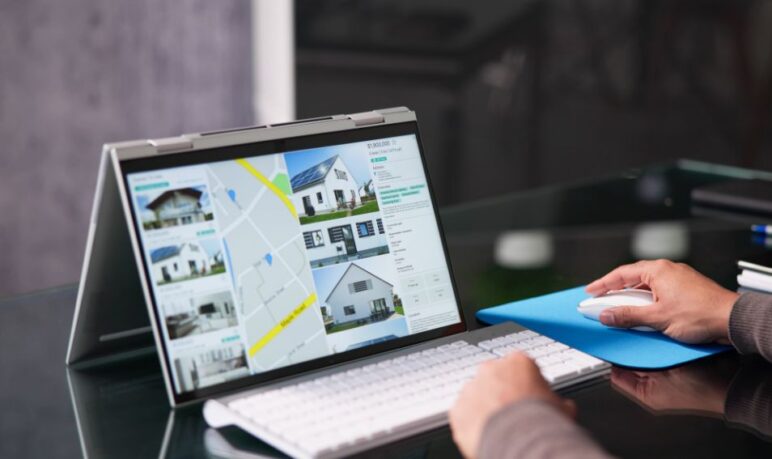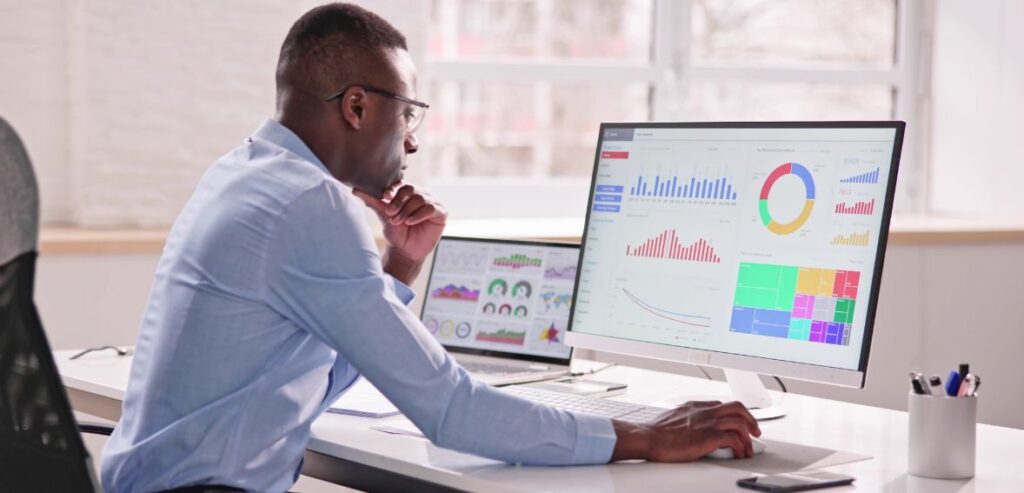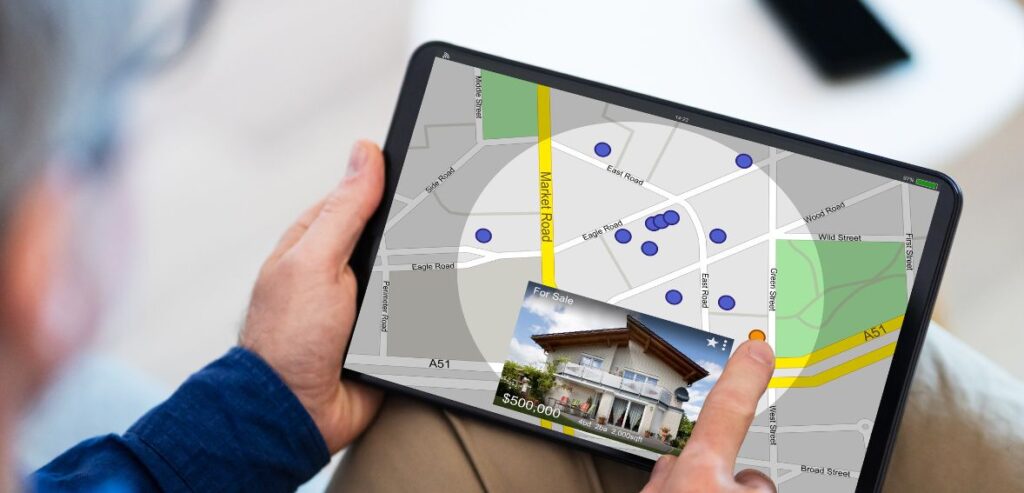
by Inez Kim July 5, 2024
Property owners with multiple investment properties often find that managing rent rolls, accounting, and other administrative tasks consumes much time and effort to maintain organization and profitability. Important documents and information can easily be overlooked or lost when relying on paper files, individual computers, or disparate cloud-based software systems.
The usefulness of a property management system lies in its ability to consolidate these operations. Such systems offer a single, cloud-based solution where all necessary data is readily accessible, simplifying the management of rental properties.
Property management software aids property managers in expanding their investments efficiently without overwhelming their workload. But how do you choose the right system? This article highlights some key points before choosing property management software for your business.
In This Article
ToggleWhat Is Property Management Software?
A property management system (PMS) is a software application designed to streamline the operations of diverse businesses. This software helps manage the revenues and expenses associated with maintaining residential or commercial properties. Standard features of property management software typically encompass trust accounting, scheduling maintenance, sending inspection alerts, listing vacancies, facilitating tenant communication, and generating reports on key performance data.
These systems are essential for businesses aiming to automate their workforce and enhance operational efficiency. Many professional property management companies use a PMS to optimize their business operations.
On-Premise vs. Cloud-Based Property Management Systems
An on-premise property management system is a software solution installed and operating on the local infrastructure of the property management company or organization. This type of system includes property management software, databases, and all related infrastructure hosted on the organization’s own servers or hardware.
In this model, all software and data are stored within the property manager’s network, allowing them full control and direct ownership of the system. Setting up an on-premise system requires purchasing software licenses and installing this software on local servers or computers. It also necessitates maintaining the physical infrastructure to support system operations.
Typically, companies using on-premise property management systems need an in-house IT team or hire external IT support to handle system maintenance. Responsibilities include software updates, data backups, server upkeep, security configurations, and addressing any technical problems.
Conversely, a cloud-based property management system is hosted on servers not located on the property management company’s premises and accessible via the Internet. This system stores and processes data in a cloud computing environment, usually managed by a third-party provider.
Cloud-based systems allow property managers to access their software and data from anywhere, using any device with internet connectivity. This model usually operates on a subscription or pay-as-you-go basis, where users pay a regular fee to access the software and utilize the cloud services.
Which One Is Right for Your Business?
A cloud-based system allows users to utilize software applications that operate on shared computing resources, such as processing power, memory, and disk storage, accessible over the Internet. Thanks to the cloud infrastructure, it’s possible to access photos, files, or software applications from any device connected to the Internet.
On-premise systems require onsite hardware. This typically includes a dedicated data server, a terminal server for remote access, and workstations with a compatible operating system. Additional dedicated computers might be needed for interfaces to external systems.
One significant benefit of on-premise software is that it offers complete control and enhanced security, though there is a risk of data loss if the hardware is damaged.
This option is suitable for:
– Banking sector
– Government-owned institutions handling confidential data
Conversely, cloud-based software offers considerable flexibility, cost-effectiveness, reduced risk of total data loss, and other advantages.
This option is suitable for:
– The hospitality industry
– Restaurants, cafes, etc.
– Government institutions like Schools, Hospitals, etc..
– Other sectors.
Choosing the Right Property Management Software
Before choosing property management software, consider several crucial factors to ensure you select the best solution.
– Understand Your Needs
Begin by evaluating your specific needs in property management software. It’s important to choose software that fits your particular requirements well. Think about the size and complexity of your property portfolio and any particular challenges you might have.
Do your properties include residential, commercial, or both? Which features are necessary for you: rent and lease management, maintenance tracking, or financial management? Also, think about the software’s ability to grow with your business.
If your property management needs are extensive, you should look for a software solution that can meet all of them effectively. Good property management software provides comprehensive lease and rent management, financial management, maintenance tracking, reporting, and communication capabilities. By carefully evaluating your needs, you can choose a property management software that meets your requirements, improves your operations, and supports your business’s future growth.
– Assessing Key Features and Functionality
Different property management software solutions vary significantly in their range of features and functionalities. It’s crucial to evaluate these to ensure they meet your specific property management needs effectively.
Key considerations when selecting the best property management software include:
– Maintenance Tracking: Efficient property upkeep is vital. Choose software that provides robust tools to monitor and manage maintenance and repair tasks.
– Rent/Lease Management: Look for software that offers comprehensive capabilities to manage rent and lease processes, including the tracking of payments, documenting lease agreements, and handling renewals efficiently.
– Communication Portals: Software should facilitate easy communication with tenants and owners through dedicated portals that enhance interactions and streamline communication processes.
– Financial Management Tools: Ensure the software includes comprehensive accounting tools that allow for tracking income and expenses, budgeting, and generating detailed financial reports.
– Integration Capabilities: Look for software that can seamlessly integrate with other critical systems, such as accounting software or CRM platforms, to ensure smooth data flow and consolidated operations.
– Customization Options: Customizing software according to your specific requirements is essential for flexibility and effectiveness in property management.
– Mobile Access: With the increasing need for mobility, choose software that offers mobile accessibility, allowing you to manage properties efficiently from anywhere, providing greater flexibility and convenience.
Selecting the right property management software requires carefully examining these functionalities to find a solution that enhances operational efficiency and aligns with your business goals.
– Check for Reporting Capabilities
Many property management software solutions now include the ability to generate insightful reports quickly. This feature helps property managers save time and improve their customer service, allowing them to manage their workloads more effectively. Property management is demanding with high turnover rates, with managers often handling hundreds of portfolios. The job’s extensive requirements, including routine inspections, can be overwhelming and exhausting.
When choosing the best property management software, prioritize solutions that streamline complex tasks efficiently and with minimal stress. Opt for software with advanced features such as predictive analytics, which enhances responsiveness and customer service quality. This technology can make your work more enjoyable by freeing up your time and allowing you to concentrate more on the strategic elements of the business.
– Evaluate Data Security
Managing properties requires dealing with sensitive financial records, tenant details, and maintenance logs. Thus, prioritizing data security and privacy is crucial when choosing property management software.
Look for software with strong encryption and consistent data backups to safeguard against data breaches or loss. It should also include user access controls and permissions, enabling you to limit access to sensitive data according to user roles.
Additionally, check that the software provider adheres to relevant industry standards and regulations, like PCI DSS or the General Data Protection Regulation, to ensure the security of your data.
– It Should Offer Advanced Invoice Generation and Bill Collection
A highly effective property management system should include key functionalities such as online bill payment and collection. To improve operational efficiency, property managers should prioritize additional features that make everyday administrative tasks easier. One important feature is the ability to generate and send invoices directly to guests through digital platforms.
This feature streamlines the entire transaction process by integrating it into your property management system. It not only allows for quicker payment collections but also reduces manual errors associated with physical billing. Additionally, this digital approach can significantly speed up the financial workflow, giving staff more time to focus on guest services and other important tasks.
Plus, an advanced PMS with integrated invoicing tools can automate aspects of financial management, such as tax calculations. This automation ensures compliance with financial regulations without constant oversight, thus minimizing the risk of compliance issues. Property managers can achieve a more efficient, accurate, and streamlined management process by choosing property management software that offers these integrated solutions, enhancing operational effectiveness and guest satisfaction.
– Check Reviews and Consult With Peers in the Industry
To evaluate the software’s user-friendliness, consider insights from others within your industry who have experience with the tools. Utilize online forums and review sites to understand the advantages and disadvantages of various software options. Asking for advice from your peers in property management can provide you with practical feedback that aids in selecting dependable software solutions.
Important questions to ask other property managers include:
– How responsive is the customer service?
– How easy is the software to learn?
– What were your main challenges with the software?
– What kind of feedback have you received from residents, employees, and clients?
Engage thoroughly in these discussions to grasp how the software performs in real-world scenarios. Use this direct feedback to avoid common issues and select a property management system that supports, rather than complicates, your operations.
When reviewing user comments, do not accept everything at face value. Focus on identifying recurring trends that show significant patterns in user experiences. This systematic review helps pinpoint the software’s typical strengths and flaws.
– Assessing Software Costs
When comparing property management software, consider more than the initial price or promotional offers to determine the true value and potential return on investment.
It’s important to scrutinize different pricing models as the least expensive option might have additional costs or may not include essential features. Consider the initial costs for onboarding and licensing, as well as recurring expenses such as subscriptions and extra charges for upgrades or support. Pose specific questions to reveal any undisclosed fees and confirm that the pricing is consistent with the services and features provided. Are there any fees at sign-up or a required minimum monthly payment? Are there setup costs or further charges after joining? Will you be committed to a long-term contract?
Choosing the right software involves finding a solution that fits your budget and reduces operational costs over time through enhanced efficiency. Despite higher initial costs, software that simplifies processes and cuts down on inefficiencies can be worth the investment.
– Focus on Customer Support
Selecting appropriate property management software is the first step in establishing a lasting relationship with a software provider. It is essential to select a system that meets your current business requirements and can scale with your future expansion.
Excellent customer service includes quick issue resolution, ongoing training and support, and active account management. It is beneficial to select providers that have U.S.-based, licensed support personnel with specific training in property management. Additionally, it is recommended to opt for companies that emphasize customer satisfaction, often shown by multiple industry awards listed on their websites.
Ensure the software offers comprehensive support services, including live, on-demand phone support available to all users, regardless of their portfolio size.
Conclusion
Selecting the best property management software is crucial for efficiently managing multiple investment properties. A good system consolidates operations, making handling rent rolls, accounting, and administrative tasks easier. Key considerations include understanding your needs, assessing features like maintenance tracking and financial management, evaluating data security, and ensuring advanced invoicing capabilities.
It’s also essential to check reviews, consult with industry peers, and assess software costs beyond the initial price. Prioritize software that offers strong customer support and the ability to scale with your business. Property owners can choose software that enhances operations and supports long-term growth by carefully evaluating these factors.
Frequently Asked Questions
Focus on features that address your main business needs. Look for tools that handle maintenance requests and tenant communication well. Ensure the software also supports compliance management and data security and has strong accounting dashboards.
Understanding the pricing model is crucial. Some software requires a subscription, while others might be a one-time purchase. Check for hidden costs like setup fees. Review contract terms, including renewal or cancellation conditions, and look for any discounts for long-term use.
Trials and demos let you test the software to see if it meets your needs. They offer firsthand experience with the interface and features without financial commitment. Use trial periods to see how the software works with your data and workflows.
Read customer reviews and get recommendations from industry peers to evaluate reliability. Reviews highlight the software’s pros and cons in real-world use. Also, check the availability of customer support via phone, email, or live chat, as good support can enhance your overall experience.


